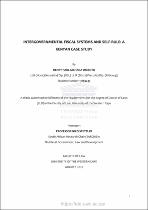| dc.description.abstract | The conferment of self-rule or autonomy to subnational governments is incomplete without the corresponding conferment of the financial means and discretion necessary to facilitate the exercise of such autonomy. This makes the design of a devolved state’s intergovernmental fiscal system and its implementation central to the realisation of subnational autonomy. To facilitate the subnational exercise of autonomy, therefore, an intergovernmental fiscal system needs to be designed in such a manner as to extend and allow the accountable exercise of fiscal autonomy by subnational governments. This entails the accountable exercise of expenditure, revenue and budgetary autonomy. On the
basis of these theoretical propositions, this study, interrogates how an integrated devolved state’s intergovernmental fiscal system should be designed such as to facilitate the accountable exercise of the margin of autonomy constitutionally extended to its subnational governments. The study begins by highlighting a pool of design features whose incorporation in the design of an integrated devolved state’s intergovernmental fiscal system holds the potential to deliver optimal outcomes for subnational autonomy. Given the similarities in
Kenya’s and South Africa’s financial constitutions, the design and implementation of South Africa’s intergovernmental fiscal system is then assessed to examine what design features have been adopted to facilitate the fiscal autonomy of its subnational governments, how their implementation has either enhanced or limited the subnational exercise of autonomy and what lessons it may offer to Kenya. With respect to the Kenyan case, the study establishes that while the Constitution is explicit in its intention to create distinct (self-ruling) county governments, this autonomy is not absolute. By indicating that the two levels of governments are interdependent, the Constitution recognises the unitary nature of the Kenyan state within which its system of devolution is set. It nonetheless extends county governments a margin of autonomy by requiring the two levels of government to conduct their mutual relations on the basis of consultation and cooperation and further requiring that they respect each other’s institutional integrity and constitutional status. The Constitution also lays out the specific objectives which its system of devolution seeks to pursue. While all these constitutional provisions reveal an intention to confer substantial political autonomy to county governments, this study sought to find out whether the financial constitution that
embodies Kenya’s intergovernmental fiscal system demonstrates a similar intention by conferring a correspondingly similar margin of fiscal autonomy to county governments and, further, whether such fiscal autonomy has been developed and enforced in practice to support the realisation of the political autonomy conferred on counties (and its objectives). The study also explored the extent to which the constitution’s design of the system of intergovernmental fiscal controls and oversight serves and has served to facilitate the accountable exercise of fiscal autonomy by county governments. | en_US |

